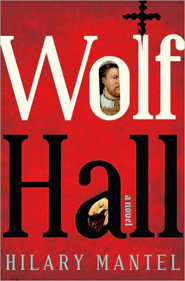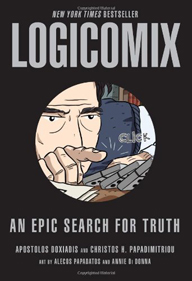-
March 15, 2010
Opening Round
-
Commentary by
Kevin Guilfoile & John Warner
-
Today’s Winner:
1Wolf Hall
John: Maybe my engagement with Logicomix was hampered by the way I read it. After diving in at the bookstore and getting through a good quarter of it in pretty short order, I brought it home and left it on the back of my toilet and worked my way through it as I engaged in the kinds of things that go on when one is sitting on the toilet. It was a perfect companion, easy to dive back into at any time, but unlike David Gutowski, who couldn’t put it down, I felt no real remorse about temporarily abandoning it once I’d taken care of business.
The book is a great achievement, layered and complicated. I feel like I actually understood the philosophy and logic in a way I never would have had it been addressed in a different form, and I also now have a passing familiarity with some of the biographies of the thinkers of Russell’s time as well as Russell himself. There’s even a metafictional component as the collaborators show up in interstitial chapters to discuss the process of putting together the book. The art is amazingly sharp and clever and the entire physical package is brilliantly produced.
But I’m going to say something here, that I probably don’t entirely believe, but I’ll throw it out there for people to cuff me around in the comments: A graphic novel will never be able to engage me in the same way even a so-so book achieves. Because of the composition of a graphic novel, I simply cannot get immersed in text. Maybe I’m too busy looking at the pictures, or something.
The only medium that has literally transported me into that virtual reality where time ceases to matter and I am in full-on Vulcan mind-meld, is old-fashioned, linear text, be it rendered on old-fashioned paper, or the new-fashioned digital reader.
I simply don’t know how to get absorbed into a graphic novel, and so, for me, even a book like Wolf Hall, which I found kind of draggy and dull at times, despite all the skill and verbal firepower Mantel brings to the equation, is preferable.
Kevin: This is the second time we have attempted an experiment with a graphic novel in the tourney and in the backs of our minds I think we knew both times the experiment was doomed. This format simply isn’t fair to most graphic novels for the reasons you describe. Even though a book like Logicomix is actually dealing with weighty subjects in a sophisticated and entertaining way, there is still what we’ve been calling a “gravitas gap” between it and a novel. And part of it has to do with the physical disposition of the two objects and the commitment that one of them takes over the other.
I’m not entirely ready to give up, although I think it might take an adjustment in our selection approach. I really enjoyed Logicomix—I’m far more predisposed to its subject than I am to the story in Wolf Hall—but it might not be the right kind of graphic novel for this format. I might have used this example before, but I’m thinking of a series like Brian Wood’s Local (illustrated by Ryan Kelly), which was reprinted in a beautiful hardcover a few years back by Oni Press. It is almost 400 pages and weighs over three pounds. It contains lots of extras in the way of art and dialogues between the author and illustrator and is a book that requires the same kind of engagement and commitment that you would give to a serious novel. If you set my copy of Local on the back of your toilet I would send a naked Rahm Emanuel to punch you in the balls.
John: When I tell the fellow book lovers in my life that I’ve transitioned a large chunk of my reading to a digital device, they often look at me in horror, like I’ve betrayed the cause. The thing is, over the eight months or so I’ve been doing some of my reading on the Kindle, I can’t detect any real difference in how I read (absorption, frequency, retention, etc.…) with the exception that it’s much more physically comfortable to read a doorstop like Wolf Hall on a Kindle than in hardcover. For the vast majority of the books I read, the only thing that matters are the rows of text lined up one after the other, and a digital device achieves this goal as effectively (or more so, in some way) as many physical books. But what your example of Local illustrates is that the physical book will remain vital as long as design enhances content.
Designer Craig Mod has a thorough, thoughtful and overall awesome meditation on these issues at his web site that has to be read in full to appreciate (and is a brilliant example of functional and beautiful design in and of itself), but he discusses the implication of a format like the iPad, which need not be wedded to a traditional book layout, on storytelling form.
What I’m skeptical about, though, is if any of these “new” forms that may be made possible by the new technology can improve on the old form. Years ago at the now-defunct Readerville web site, George Saunders participated in a discussion where he was asked about his method and intentions and he said this:
I think that what any of us pays for when entering into a reading experience is that feeling of seeing another mind at work, and not at work in a rational way. There’s something thrilling about seeing this other mind at work in this blissful and private and self-referential way, and then suddenly your mind joins it. How weird and inexplicable that is. There’s a sort of knowledge that goes beyond our mundane everyday knowledge. The reader and writer are being smarter together than either one could be separately. This is like a sort of experiential proof of the fact that our apparent separation is delusional.
It’s about as good an explanation of what I think happens when a book takes hold of me as I’ve ever heard. Though, under present modes, even as we join with a book, even as I feel like I’m in conversation with a text, that conversation is contained within me and doesn’t extend beyond my own private moments with the text. Later I can write to say, you, about this great book I read, and once a year our Tournament gives me a platform to opine on these things, but they’re all after the fact and aren’t really relevant to that moment of engagement. I suppose what Craig Mod is thinking of is some kind of narrative that allows both absorption and interactivity in the moment.
The problem I have, though, is I just can’t see it. I can’t conceive of how that storytelling would work beyond a kind of more sophisticated Choose Your Own Adventure. Part of what I pay for when I read is letting that other intelligence pour into me, and if I begin to muck around with that, then it feels like all the sudden we’re up to something different, something (to me) less satisfactory.
But maybe I’m just frightened of the future, maybe people like you and me that put the words down one after another are going to go by the way of the dinosaurs, or rational conservatives.
Kevin: Like everyone else, I am saving up my Mountain Dew money for an iPad. E-books will be better for the environment and will encourage invention. (One of the great things about Apple is that the company releases these products—iPhones and iPads—without knowing exactly how their customers will ultimately find them useful.) Here’s a demonstration from Penguin U.K. about how some of their current titles might be adapted for the iPad. This is really nascent stuff, but pretty cool. I think it demonstrates, though, that the first revolution will probably be in things like children’s books, textbooks, travel books, etc. I don’t think anybody yet has a great idea how to do anything but duplicate the experience of reading an actual novel on an e-reader.
And there is going to be a trade off. E-readers are going to make a book like Infinite Jest easier to read and much more accessible—and that’s terrific—except I don’t think David Wallace would have really wanted the reader to have that option. He expected you to feel the discomfort of having the story interrupted as you fumbled to the back for the endnotes. He wanted you to be yoked to this mammoth thing, heavy in your backpack and weighing on your lap. He put the notes at the end specifically so you couldn’t rip it in half and lighten the load. You can read the book without all that, on a wafer-thin iPad with the endnotes appearing in elegant pop-up windows, but you won’t be experiencing that book the way the author intended.
I’m not taking a stand against technology. I fully embrace our new handheld electronic overlords, and I believe the good will far outweigh the bad. But it is worth meditating on what will be lost.
On the other hand, an interactive edition of Wolf Hall might have been just the thing I needed to get me through it.
John: Like Let the Great World Spin, Wolf Hall has prizewinner written all over it, but while I thought McCann’s book was stuffed with life and energy, Wolf Hall felt kind of embalmed, like Mantel had released these historical characters from the amber in which they’d been fixed, only to shift their positions and tuck them safely away again. Still, I’ve got no beef with the judge’s verdict in this case.
Kevin: Every year in this tourney I have one of those “It’s not you, it’s me,” breakups with a book and Wolf Hall was on the receiving end this year. It’s a superior achievement, ambitious and well written, and the whole time I was reading it I wished I was reading something else. Maybe it’s because I know just enough about English history to know the broad outlines of what would happen, but not enough about English history to be invested in the undoubtedly clever ways she reinvents these real people as fictional characters. It’s a book filled with nuances that I sensed were being lost on me. I tried to just read it as an entirely invented piece of fiction and I couldn’t. It’s a failure that was clearly mine.
It’s a testament to our respect for Mantel’s talents, however, that we both placed Wolf Hall among the top five in our confidence rankings. I get 13 points for this win and you get 12, giving me a 50-41 advantage in our little side bet. And if you need some added incentive, I was contacted yesterday by the folks at Madly Pop’n, who will be putting together the handpainted tin of gourmet popcorn for you if you win. They are so excited to be a part of the Tournament of Books that they have promised to mix up a special batch of the not-available-in-stores BaCorn Cheddar for you. That’s bacon-and-cheese-flavored popcorn, dude. Consider the pot sweetened!
John: Or salted, as the case may be here.
Kevin Guilfoile is a contributing writer for TMN. His debut novel, Cast of Shadows, has been translated into more than 17 languages, and his second novel, The Thousand, will be published in August 2010 by Alfred A. Knopf.
John Warner is a contributing writer for TMN. He is the author of Fondling Your Muse: Infallible Advice From a Published Author to the Writerly Aspirant. He teaches at Clemson University.

















